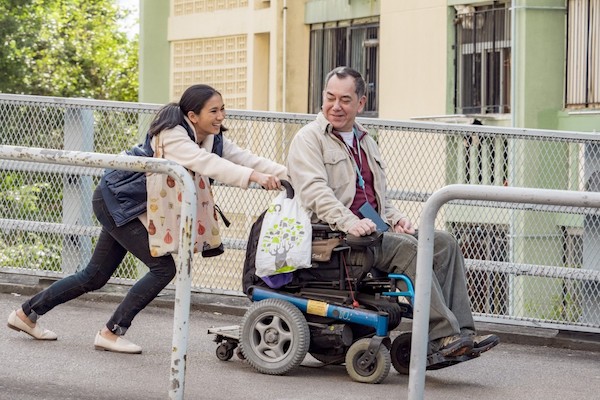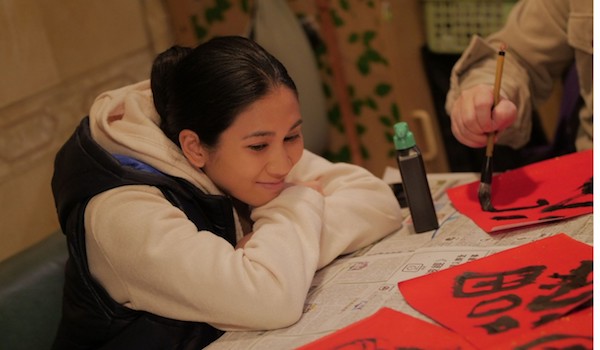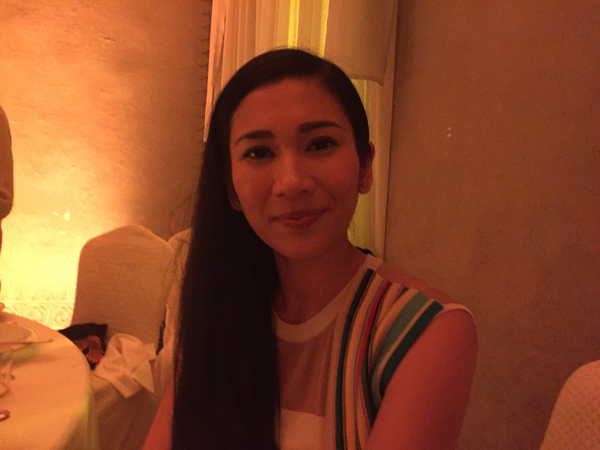
An educator and activist as well as performer, Crisel Consunji made her feature-film debut in the Hong Kong production Still Human. In it she is Evelyn, a Filipina domestic worker hired to care for Leung, a paraplegic played by Anthony Wong. Consunji won the Best New Performer award at the recent Hong Kong Film Awards, where Still Human also received awards for Wong (Best Actor) and Oliver Siu Kuen Chan (Best New Director).
Consunji will introduce Still Human at the New York Asian Film Festival on Sunday, July 14, at 6:00, and participate in a Q&A session after the screening. We spoke at the Far East Film Festival in Udine, Italy, where Still Human won both audience and critics’ awards.
Can you talk a bit about your role in Still Human?
I play Evelyn, who’s a migrant Filipino worker who finds herself in Hong Kong doing a job as a domestic worker. She actually comes from an interesting background, she was a nurse in the Philippines, but her life was in a shambles. And her way to move forward is come to Hong Kong to make money. But she doesn’t have a nursing license, so she has to be a domestic worker. And in the process she’s putting a lot of her dreams on hold.

What kind of research did you do for this character?
The long story is I received both bachelor and masters degrees in political science in the Philippines before going to Hong Kong to work as a performer. I’ve always been interested in migration, identity, and global citizenship. The sad reality is that the Philippines’ biggest export is our people. So we were studying the patterns of migration, not just seeing what it brings to the country economically, but how it shakes the very foundations of our social and political systems.
When I got to Hong Kong, I continued research on migrant workers, Filipinos going abroad. I wanted to understand what do migrants feel, how do they live. So I immersed myself. I decided to do some community work. Well, I thought I was doing community work, but actually I was the one being shaken, because I realized that they knew so much more in many ways than I did.
I conducted workshops in financial literacy, in confidence and empowerment. One of the projects was a drama workshop, which was an opportunity for them to tell stories. They were not what you would expect. It was not “Woe is me” or “My life is bad.” The stories were about empowerment. Many of them said I am here for a reason, I want to find my goal, make something of my life.
I realized that a lot of their stories were at their core just like yours and mine. Problems with family, problems with the people they love, with marriage, with money, with what happens next in their lives.
Their stories are so diverse, but people want to build a simple box and try to put everybody in that box. And say, “Oh, these are domestic workers.”
We have a similar problem in the US, a bias against immigrants, against ethnic and cultural minorities. We tend to demonize them until we actually meet one.
Exactly. When you meet that person on a human level, you don’t see them as an “other.” They’re no longer the other, the barrier breaks, because you realize that your feelings and experiences are pretty much the same. I feel like that’s what Still Human is all about. It’s about forgetting, forgetting the social, political, economic barriers that divide us.
People tend to overgeneralize without listening to the real stories of the actual people in the margins. They come up with a very hasty generalizations of how they think these people feel. When I met [director] Siu Kuen, I felt she had a goal, she was empathetic. I felt this director was going to treat our story with integrity and with respect.

That’s what made me decide to take the role. Because honestly, I was afraid. I didn’t have much experience, outside of performing onstage. I didn’t want to fail. But I also felt morally compelled to be part of the project. It’s very important to claim the narrative. Now is the time where the stories of people at the margins are being brought to life. People are listening. I really wanted to be part of the process.
But I didn’t see it as an acting project, I saw it as an empowerment project for the people I represent.
Director Oliver Siu Kuen Chan said that your character is loosely based on Leeh Anne, a real-life domestic worker who has won several competitions for her photography. In fact she taught you how to hold a camera. You can see her photos in the film. Did that constrain you at all as an actor?
No, because I was not playing her. My character in Still Human, it’s not so much, “Oh she’s a domestic worker,” and that allows you to come up with your own judgments. What actually happens during the course of the movie is that you learn she is coming from a bad marriage, she has no connection with her family, she’s trying to pursue her dreams but she has no resources. And she comes across this man, Leung, who himself is marginalized. And together, a year in the life chronicles how their relationship develops, and they overcome barriers.
So “still human” doesn’t only refer to Leung Cheong-wing, Anthony Wong’s character, but to your Evelyn as well.
And to their relationship, their dynamic.
How did you get to Hong Kong? Did you know Cantonese?
I’ve lived in Hong Kong for eleven years. What brought me there was Disney, working as a performer in Disney shows. In fact my first three years in Hong Kong were with Disney. There was one particular role I liked, which required the host to narrate a show in Cantonese. When I told the casting director I wanted to host, he said, “You don’t speak Cantonese.” I asked, “If I can speak it, will you cast me?” And he said you can try. So I did a little bit, and now I have a foundation in it. But I’m still learning.
What was it like working with Anthony Wong?
Thankfully I did not know who he was. Now I do. Anthony and I met for the first time for a half-day script reading. The next time we met was weeks after, on the first day on set.
He said that he works as much from personal experience as from observation. Do you work the same way?
I’m not sure actually. I personally got to hear the stories of a lot of migrant women. And when these stories come from the women themselves, they’re very powerful. It’s very difficult not to be moved. So I feel that in parts of the process, I was drawing from people I’ve met. But it’s really about trying to live that story, accepting and embracing that story, their perspective.
I want to empathize, but I will never truly grasp that perspective.
To a certain amount, you do. I think disappointments, challenges in trying to get somewhere—these are things that happen to everybody.


